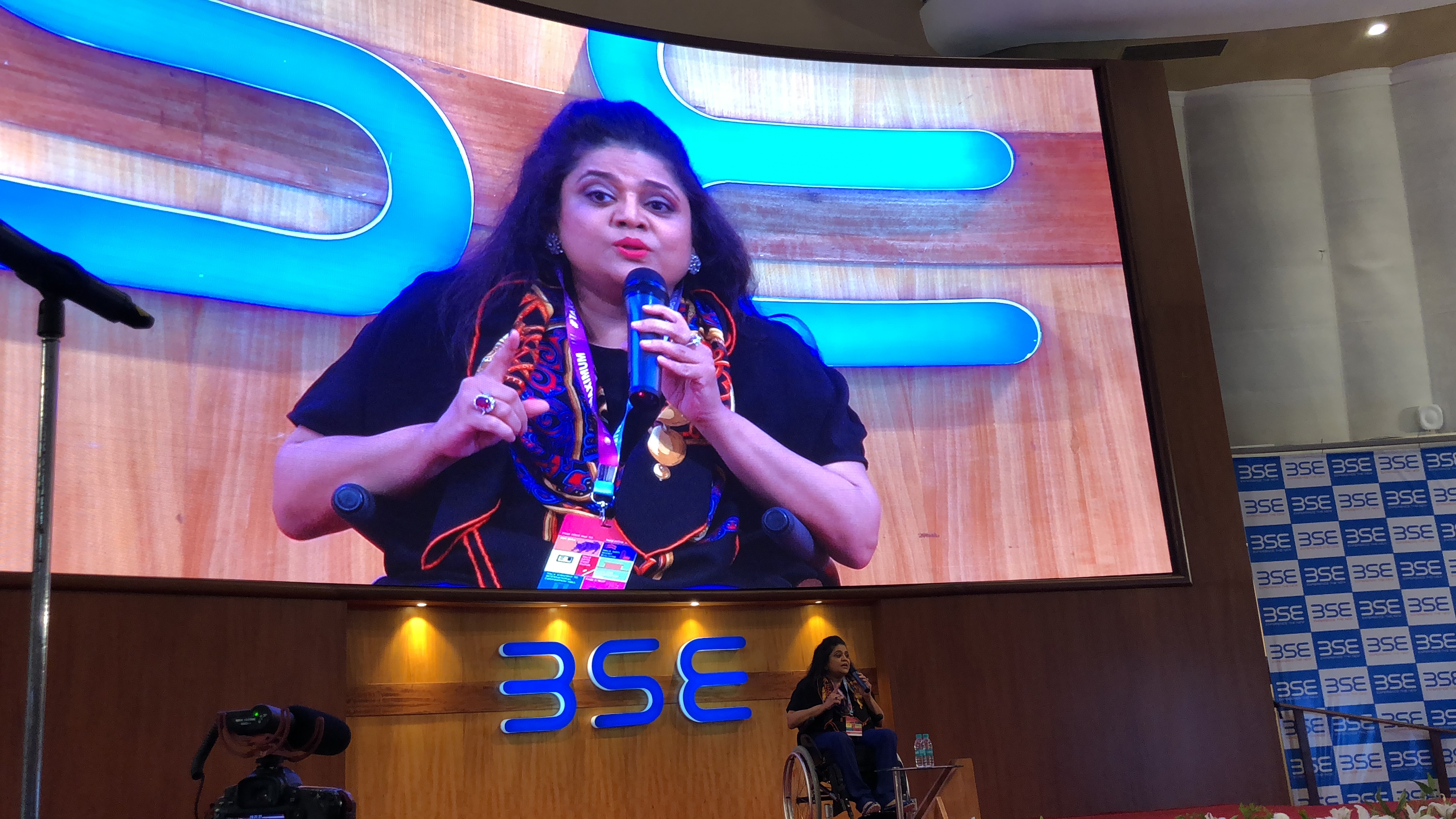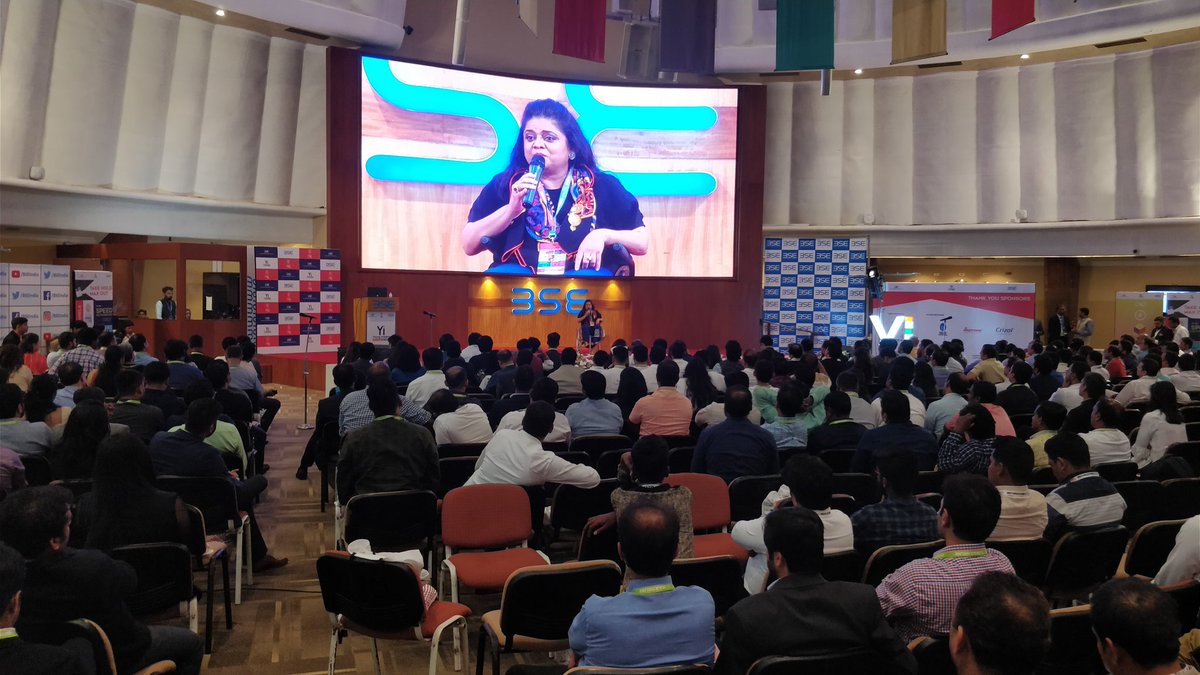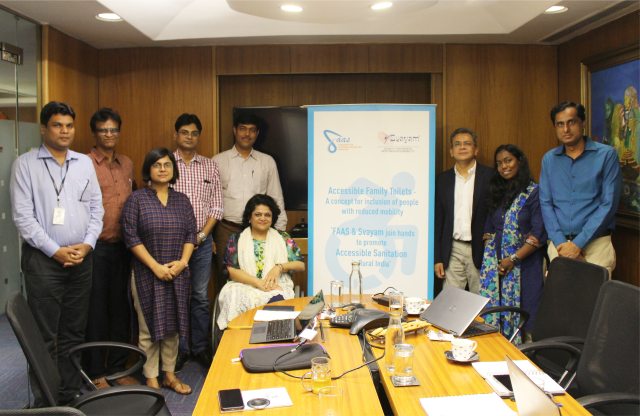10 March 2018, Mumbai
Svayam’s Founder-Chairperson Ms. Sminu Jindal today addressed the CII-Yi: Annual Youth Summit – TakePride 2018, held at the historic Bombay Stock Exchange (BSE) in Mumbai, along with several visionary speakers from across the sectors who spoke during the two-day annual event during 09-10 March 2018. These included Kamal Haasan (actor), Ajeet Khurana (Head – Blockchain & Cryptocurrency Committee of India), Anand Piramal (Founder – Piramal Realty), Arnav Ghosh (CEO – India, Blippar), Ashish Chauhan, (MD & CEO Bombay Stock Exchange), Balki R, (Filmmaker), Boman Irani (actor), Chandrajit Banerjee (Director General CII), Dia Mirza (actor), Dr. R. Mashelkar (renowned Scientist – Padma Shri, Padma Bhushan & Padma Vibhushan Honouree), Gauri Shinde (filmmaker), Krishnakumar T (President – Coca Cola India & Southwest Asia), Lavanya Nalli (Chairperson – Nalli Group), Madhukeshwar Desai (Vice President – Youth Wing Of BJP), Mickey Mehta (Celebrity Fitness Guru & Coach To Femina Miss India Pageant), Radhanath Swami (Spiritual Teacher), Suresh Narayanan (CMD – Nestle India).
across the sectors who spoke during the two-day annual event during 09-10 March 2018. These included Kamal Haasan (actor), Ajeet Khurana (Head – Blockchain & Cryptocurrency Committee of India), Anand Piramal (Founder – Piramal Realty), Arnav Ghosh (CEO – India, Blippar), Ashish Chauhan, (MD & CEO Bombay Stock Exchange), Balki R, (Filmmaker), Boman Irani (actor), Chandrajit Banerjee (Director General CII), Dia Mirza (actor), Dr. R. Mashelkar (renowned Scientist – Padma Shri, Padma Bhushan & Padma Vibhushan Honouree), Gauri Shinde (filmmaker), Krishnakumar T (President – Coca Cola India & Southwest Asia), Lavanya Nalli (Chairperson – Nalli Group), Madhukeshwar Desai (Vice President – Youth Wing Of BJP), Mickey Mehta (Celebrity Fitness Guru & Coach To Femina Miss India Pageant), Radhanath Swami (Spiritual Teacher), Suresh Narayanan (CMD – Nestle India).
The Young Indians (Yi), the annual flagship leadership Summit by the Confederation of Indian Industries (CII) is known to celebrate the achievements of entrepreneurs, inspire young entrepreneurs, and mull over the future roadmap. TakePride offers a platform to both sung and unsung heroes/champions who share an inspiring story and leave food for thought for the young leaders of CII-Yi eventually both in the interest of the organization as well as their personal- professional trajectory.
Ms. Jindal spoke at length on the subject close to her heart – accessibility. Around 600 Young Indians (Yi) from 40 Chapters across 27 states listened to her address that touched on her early years after car accident, her struggles in the men-dominated steel and gas industry, and her initiative Svayam and its numerous achievements in making India accessible.
Talking about her accident, she said: “I met with a car accident at the age of 11 as my driver was drunk; I became a wheelchair user for the rest of my life due to severe spinal injury. Initially, I could not cope with what had happened with me at that tender age. I was gloomy as I could not dance anymore, though my parents ensured I lived a normal life and got best education. They got ramps and lifts built at home and school and the college. I was born in an affluent family, but then I thought what about others who do not have resources. That is how accessibility became my passion as I wanted to see everyone with reduced mobility to live his/her life in safe, dignified and productive way.”
She told the highly attentive audience that accessibility benefits everyone and not just persons with disabilities. “Think about an elderly, a pregnant woman, and an injured. We have to accept the reality and be ready for it. Think about arthritis and accidents. Also, India’s 65 per cent population is below 35; think about 30 years from now. Will they not need accessible infrastructure and services? We have to be ready now before it hits us,” she said.
Ms. Jindal added: “People retire at 60, but thanks to the improved healthcare, we have longer years post retirement. Due to lack of accessible infrastructure, people tend to remain in the golden cages called homes. So, this is not about only 2 per cent population (persons with disabilities). It is a much larger issue. If older adults get accessible homes and public infrastructure, they will, of course, come out and shop, visit places which not only increases their own happiness quotient, but also boosts our GDP. This is how we can make them feel useful, else they may feel redundant. We are all social animals & can’t live in silos.”
She wondered why accessibility is treated as a sub topic under disability. She narrated the infamous Jet Airways incidence of December 2007 when she was asked to sign an indemnity bond. The signing would have absolved the airliner from all the responsibilities. She had refused to sign the bond and later the airliner had to issue a public apology to her.
Ms. Jindal also strongly raised the issue of lack of accessible toilet in the aircrafts. “These airlines can have first class cabin and luxurious showering room, but not an accessible toilet! Imagine holding your bladder for 6-10 hours in a long-haul flight,” she wondered.
Svayam’s Founder told the young audience how Svayam helped the Archaeological Survey of India (ASI) to make the first ever World Heritage Site of Qutub Minar accessible, followed by other WHS such as the Taj Mahal, Red Fort and Fatehpur Sikri Group of Monuments. “The footprints increased phenomenally after these monuments were made accessible,” she said.
She also talked about Svayam’s contribution in 2011 Census’ campaign – “Stand Up and Be Counted”. It was the clarion call for persons with disabilities to have themselves enumerated in the final round of the 2011 Census. Svayam raised awareness, so that families did remember to answer question No. 9 – the question framed to gather information about number and categories of disabilities. During the campaign, Ms. Jindal had said that by hiding, person with disabilities deny themselves the right to be citizens and deny the government an opportunity to plan for their empowerment.
Ms. Jindal said, “There is no shame in having a disability. You may have a disability; still, you can be glamourous and pursue your passion as usual.”
She also said that the Rights of Persons with Disabilities Act, 2016 has increased number of disabilities from 7 to 21. “This increases the importance of accessibility in built environment.”
Ms. Jindal also talked about Svayam’s international presence. In 2012, the Transport Research Board’s (TRB) Standing Committee on Accessible Transportation and Mobility (ABE60) agreed to establish the Permanent Secretariat of the Triennial TRANSED Series of conferences to be run by Svayam as its sole contribution to the promotion of mobility and transportation for the elderly and the disabled people.
She also talked about small little changes which can make big differences in the lives of people with reduced mobility, such as a proper ramp gradient, wider doors, ‘but most importantly an open heart!’
“If I can, you can, and together, we can,” Ms. Sminu Jindal exhorted the young audience to work for accessibility now for their own better tomorrow.
Young Indians (Yi) Tweeted:



